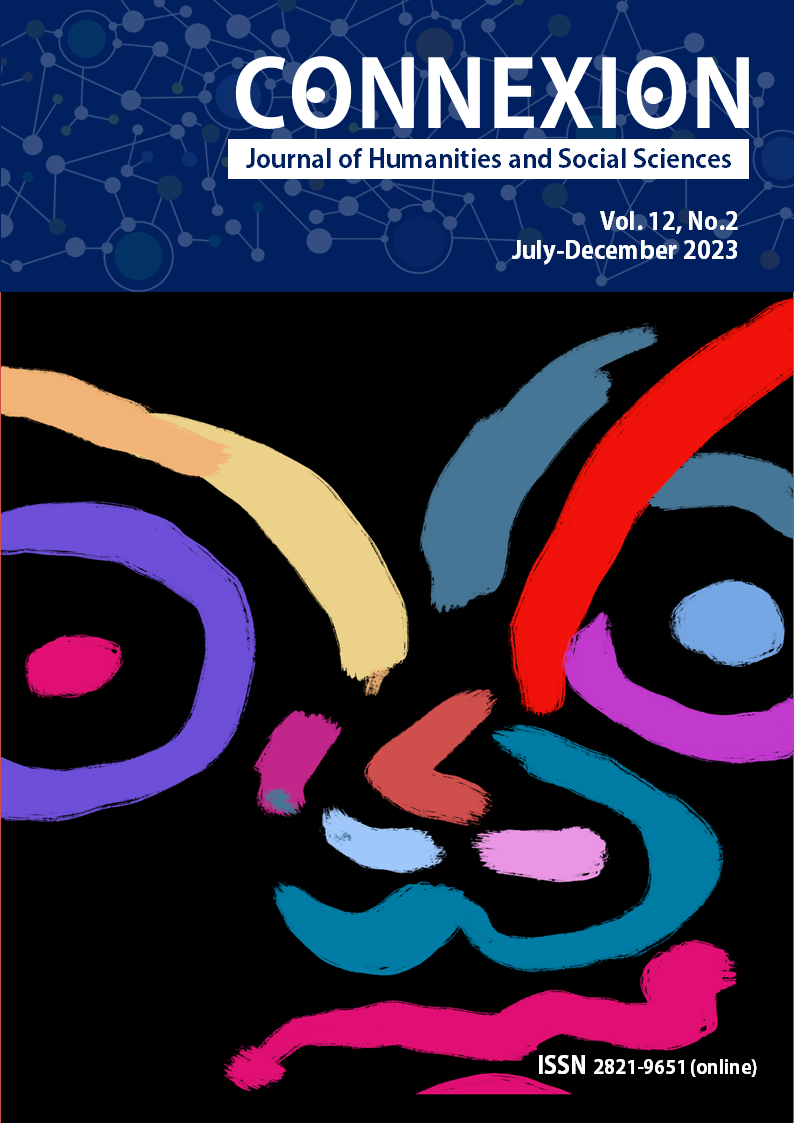การทูตเชิงวัฒนธรรมของจีนต่อประเทศไทยผ่านสถาบันขงจื่อ
Main Article Content
บทคัดย่อ
การวิจัยครั้งนี้มีวัตถุประสงค์เพื่อศึกษารูปแบบการดำเนินงานและบทบาทของสถาบันขงจื่อในประเทศไทย และวิเคราะห์ผลกระทบของการทูตเชิงวัฒนธรรมของจีนต่อประเทศไทยผ่านสถาบันขงจื่อ เป็นการวิจัยเชิงคุณภาพโดยใช้วิธีการวิจัยเอกสารและการสัมภาษณ์เชิงลึก ผลการวิจัยพบว่า แนวทางการดำเนินงานหลักของสถาบันขงจื่อในประเทศไทยมุ่งหมายที่จะเสริมสร้างความเข้าใจในด้านภาษาและวัฒนธรรมจีน ส่งเสริมการแลกเปลี่ยนทางการศึกษาและวัฒนธรรม และพัฒนาความร่วมมือระหว่างไทย-จีนในหลากหลายมิติและได้มีการขยายขอบเขตการดำเนินงานสู่การร่วมพัฒนากำลังคนให้มีทักษะภาษาจีนและทักษะทางวิชาชีพสำหรับธุรกิจอุตสาหกรรม ผลกระทบจากการดำเนินงานของสถาบันขงจื่อ ซึ่งเป็นแหล่งทรัพยากรอำนาจละมุนของจีนในการขับเคลื่อนการทูตเชิงวัฒนธรรมทางด้านการศึกษาภาษาและวัฒนธรรมจีนต่อประเทศไทยได้ก่อให้เกิดประโยชน์ต่อสังคมไทยนับตั้งแต่จัดตั้งเมื่อปี พ.ศ. 2549 ในด้านการพัฒนาการเรียนการสอนภาษาจีนในประเทศไทยการสร้างโอกาสในการเข้าถึงการเรียนรู้ภาษาจีน ความร่วมมือและความสัมพันธ์ที่ใกล้ชิดระหว่างหน่วยงานของทั้งสองประเทศ ปัจจุบันไทยและจีนได้ยกระดับความร่วมมือทางการศึกษาเพื่อมุ่งสู่การพัฒนาคุณภาพ
การเรียนการสอนภาษาจีนให้ดียิ่งขึ้น
Article Details

อนุญาตภายใต้เงื่อนไข Creative Commons Attribution-NonCommercial-NoDerivatives 4.0 International License.
Copyright
Connexion: Journal of Humanities and Social Sciences has an exclusive right to publish the accepted articles in any form. However, the author retains the following rights:
1. The right to the ownership of the article;
2. The right to use all or part of the article in his/her other works;
3. The right to re-produce the article for personal use or for use in the author’s organisation, in which case the author must obtain permission from Connexion: Journal of Humanities and Social Sciences;
4. The right to make copies of all or part of the work for educational use or for the author’s use in classroom teaching; and
5. The right to include the work (both the preprinted and printed versions) in an institutional repository.
เอกสารอ้างอิง
Brazys, S., & Dukalskis, A. (2019) Why U.S. universities are shutting down China-funded Confucius Institutes, Available: https://www.washingtonpost.com/news/monkey-cage/wp/2019/01/11/u-s-universities-have-shut-down-confucius-institutes-heres-what-you-need-to-know/ [17 February 2021]
Chakraborty, K. (ed.). (2013) Cultural diplomacy dictionary, New York: The Institute for Cultural Diplomacy, Available: https://www.culturaldiplomacy.org/culturaldiplomacynews/content/pdf/Cultural_Diplomacy_Dictionary.pdf [25 July 2021]
Chinese International Education Foundation (CIEF). (2021) Global network (全球网络), Available: www.cief.org.cn/qq [15 January 2021] (in Chinese)
Chinese International Education Foundation (CIEF). (n.d.) About CIEF (简介), Available: www.cief.org.cn/jj [12 January 2021] (in Chinese)
Devawongse Varopakarn Institute of Foreign Affairs. (2013) Dictionary-abbreviation on diplomacy and foreign affairs (คำศัพท์-คำย่อทางการทูตและการต่างประเทศ), 3th edition, Bangkok: Amarin Printing and Publishing. (in Thai)
Dhurakij Pundit University (DPU). (2021) Maritime Silk Road Confucius Institute (สถาบันขงจื่อเส้นทางสายไหมทางทะเล), Available: https://www.dpu.ac.th/msrci/documents.php [6 December 2021] (in Thai)
Fan, W., Jutaviriya, K. & Punndhanamahakarune, D. (2021) Chinese policy on promoting the development of confucius institute to Thailand (นโยบายของจีนในการส่งเสริมการพัฒนาสถาบันขงจื่อสู่ประเทศไทย), Political Science and Public Administration Journal Khon Kaen University, vol. 6, no. 1, pp. 1-30. (in Thai)
Galindo, G. (2019) Brussels university to close Chinese-funded institute after espionage accusations, Available: https://www.brusselstimes.com/belgium/83195/brussels-university-to-close-chinese-funded-institute-after-espionage-accusations-vub-confucius-institute [17 February 2021]
Manussurakul, S. (2020) Confucius institutes the silently spread of China’s influence (สถาบันขงจื่อ ซุ่มเงียบแผ่อิทธิพลจีน?), Available: https://themomentum.co/confucius-institutes/ [6 December 2021] (in Thai)
McClory, J. (2019) The soft power 30: A global ranking of soft power 2019, Available: https://www.softpower30.com/wp-content/uploads/2019/10/The-Soft-Power-30-Report-2019-1.pdf [12 April 2021]
Nguyen, D. T. P. (2006) China’s cultural diplomacy in Southeast Asia from the 1990s to the present: A case study of Thailand and Vietnam (การทูตวัฒนธรรมของจีนในเอเชียตะวันออกเฉียงใต้จากช่วงทศวรรษ 1990 จนถึงปัจจุบัน: กรณีศึกษาประเทศไทยและเวียดนาม), Master’s thesis, Chulalongkorn University. (in Thai)
Nye, J. (2017) Soft Power: The origins and political progress of a concept, Palgrave Commun, vol. 3, Article number: 17008. https://doi.org/10.1057/palcomms.2017.8
Nye, J. S., Jr. (2004) Soft power: The means to success in world politics, New York: Public Affairs.
Qichen, Q. (2011) World situations and China’s foreign policy (สถานการณ์โลกกับการทูตจีน) (trans. A. Fungthamasan), Bangkok: Matichon Public House. (in Thai)
Statista. (2021) Number of Confucius Institutes in Asia as of December 2018, by country, Available: https://www.statista.com/statistics/879176/china-confucius-institutes-in-asian-countries/ [6 December 2021]
Sukkaew, K., & Sodsuk, N. (2013) The policy of China’s soft power toward Thailand and its impact on Sino-Thai Relation (นโยบายอำนาจละมุนของจีนต่อไทยและผลกระทบต่อความสัมพันธ์ไทย-จีน), Journal of Finance, Investment, Marketing and Business Administration, vol. 3, no. 2, pp. 643-644. (in Thai)
The Academy for Cultural Diplomacy. (2021) Historical acts of cultural diplomacy, Available: https://www.culturaldiplomacy.org/academy/index.php?en_historical-acts-of-cd [25 July 2021]
The Council on Foreign Relations. (2018) China’s big bet on soft power, Available: https://www.cfr.org/backgrounder/chinas-big-bet-soft-power [6 December 2021]
Tungkeunkunt, K. (2016) Culture and commerce: China’s soft power in Thailand, International Journal of China Studies, vol. 7, no. 2, pp. 151-173.
Xi, C. (2020) New NGO to operate China’s Confucius Institutes, ‘disperse misinterpretation’, Available: https://www.globaltimes.cn/content/1193584.shtml [1 October 2023]
Zamorano, M. M. (2016) Reframing cultural diplomacy: The instrumentalization of culture under the soft power theory, Culture Unbound, vol. 8, no. 2, pp. 165-186. https://doi.org/10.3384/cu.2000.1525.1608165


